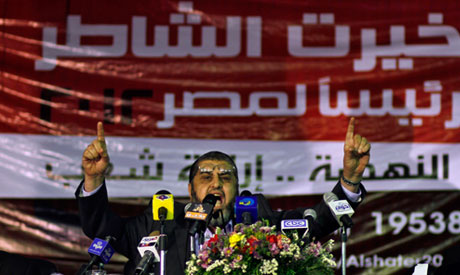 One day after Tuesday's decision by the Supreme Presidential Electoral Commission (SPEC) to uphold a ruling that disqualified him from the presidential race, Khairat El-Shater told a rally that the decision was unjust but insisted, "it's not about me, it's about Egypt."
One day after Tuesday's decision by the Supreme Presidential Electoral Commission (SPEC) to uphold a ruling that disqualified him from the presidential race, Khairat El-Shater told a rally that the decision was unjust but insisted, "it's not about me, it's about Egypt."
It's not about me, it's about Egypt, says Brotherhood's El-Shater
By-Ahram
Copts and Poliltical Islam
00:04
Monday ,23 April 2012

El-Shater also directed scathing criticism towards the SPEC for refusing to acknowledge that he presented all the necessary documents to ensure that his legal status to run for president was sound. However, he stressed that neither he, nor the Brotherhood, were concerned about holding any political position, pointing out that when he heard of the SPEC's initial decision he was on his way to a rally and decided to continue with the event because he wanted to talk to the people about his vision.
The SPEC made the initial decision on Saturday to ban El-Shater and nine other candidates from running for the nation's top post. All appeals, including El-Shater's, were rejected on Tuesday evening. El-Shater, however, claimed that the commission deliberately ignored the documents he presented.
"Personally I am happy that I am no longer part of the presidential race. However, if we are talking about the interest of the nation, then what happened yesterday was a huge crime," he said.
However, El-Shater said that he and the entire Brotherhood would put their full support behind their new candidate Mohamed Mursi, the president of the group's political wing the Freedom and Justice Party (FJP). When question marks were raised regarding El-Shater's legal status the group presented Mursi as a substitute in case El-Shater was disqualified.
El-Shater also talked at length about the sacrifices made by the Brotherhood during the Mubarak era when more than 100,000 members were unjustly imprisoned and their personal property confiscated. He added that the group had always worried about Egypt and its problems and when he and other members were jailed they still gathered donations to build hospitals and community centres to help the people.
"We paid this huge price because we as a group have a vision that one day we will be able to create a system that is built on justice," El-Shater said.
He stressed that he did not want to defend himself because the crisis was not just about him but about Egypt and its safe transition to democracy. He said he represented a vision that is embodied in the Muslim Brotherhood and the FJP and he would continue to fight for that vision.
"So we will continue because we are fighting for a cause, a nation and not just a position," El-Shater said.
He also said the group registered more than one candidate for the presidential elections, because it was aware that many groups affiliated to the Mubarak regime were attempting to abort the revolution.
El-Shater also directed venom at the military council and the way it had been administering the country during the transitional period. The military council refused to remove the El-Ganzouri government despite Parliament's requests and also ignored its plans to create a coalition government that had representatives of the country's various political forces, he added.
This, El-Shater said, made it clear that the council is not ready to transfer power as scheduled in June and it wanted to continue ruling the country.
"We are now facing an attempt to recreate the old regime," he said.
He also slammed the SPEC and its head Farouk Sultan. He said the Brotherhood had "painful memories" of Sultan who he described as a Mubarak loyalist who used to sabotage its syndicate elections during the Mubarak era. However, he added that the Brotherhood hoped Sultan had changed his ways after the revolution but he had not.
At this point, El-Shater waved a stack of papers, saying "What we have here will expose them."
He added that if the SPEC believed that Article 28 of the constitutional decree would give them immunity then they should beware that "there is no immunity from God's justice."
El-Shater described the decision to eliminate him from the presidential race due to his criminal record as "laughable" because he was imprisoned by a military court while fighting against the regime.
"If you want to try me for this, then you might as well go try all 20 million [Egyptians] then maybe they should also try all 20 million who went to Tahrir Square," he said.
He also stressed that the Brotherhood would head to Tahrir Square to join Friday's million man march against the military council and the remnants of the Mubarak regime, which was planned by various political forces for what he called "the real transition of power."
"I just wish the Egyptian people would wake up because their revolution is being stolen," El-Shater said.
However, El-Shater insisted that his elimination did not mean that the group was excluded from the presidential race because it still had Mursi as a candidate who everyone in the group would support.
When asked by one of the reporters if Mursi was only presented by the group as a "spare tyre," El-Shater brushed the idea aside.
"We don't have this culture of individuality in the Brotherhood. The idea that any member of the group is a replacement for the other one doesn't make any sense because we work as a group."


